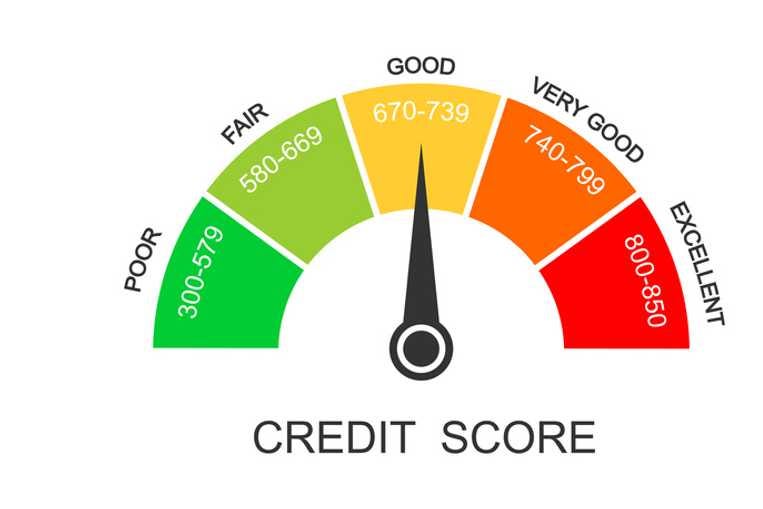Credit scores are a very important part of personal finance, as they affect everything from mortgage rates to credit decisions. A person’s credit score is a three-digit number that indicates how creditworthy they are, or how likely they are to repay the money they borrow. Information from a person’s credit records, such as their credit history, current debts, and payment history, is used to calculate this number. Understanding credit scores is important for anyone who wants to better manage their money and make smart credit choices.
1. How to Find Your Credit Score
Credit scores are based on many factors, but FICO and VantageScore are the most popular scoring methods. They focus on five main areas: payment history, amount owed, length of credit history, new credit applications, and type of credit used. Payment history is the most important part of your score, as it shows how important it is to pay your bills on time. Also known as the “credit utilization ratio,” the amount owed shows how much debt a person has compared to the amount of credit he or she has available. There are benefits to keeping utilization rates low. A longer credit history is generally better because it shows that you’ve been using your credit cards longer. The new credit search tool shows how many people have recently applied for credit, and the type of credit used shows the type of credit account used, such as mortgages, installment loans, and credit cards.
2. Why Credit Scores Matter
There are many important reasons to have a good credit score. First, it makes it harder for you to get loans and credit. Credit scores help lenders understand how risky someone is, and people with higher credit scores are more likely to get credit cards, mortgages, and car loans. Additionally, people with better credit can often get lower interest rates, which can save them a lot of money over time. Credit scores affect more than just loan applications. They can also affect rent, insurance, and even job applications in some cases. Employers may look at credit history as part of the hiring process, especially for jobs that involve handling money.
3. Understand the Differences Between Credit Score Ranges
Credit scores typically range from 300 to 850, with different numbers indicating different levels of reliability. A score below 580 is a poor score, and a score between 580 and 669 is a good score. Your credit score should be between 670 and 739 for a good credit score and above 740 for an excellent credit score. Different lenders may have different criteria for a good credit score, but understanding the numbers can help people set achievable credit health goals. A goal is a number in the “good” or “excellent” range. This will give you more loan options and better terms.
4. Common Factors That Can Lower or Increase Your Credit Score
Credit scores can drop for several reasons. Late payments, failures, and bankruptcies can significantly lower your score, and the impact can last for years. A high credit utilization ratio can also negatively impact your credit score, letting lenders know that a borrower may have too much debt. Additionally, it can be bad to receive too many hard inquiries when you apply for new credit. On the other hand, good habits like paying your bills on time, keeping credit card balances low, and keeping track of old credit accounts can help improve your credit score over time.
5. Monitor Your Credit Score
Keeping track of your credit score is an important part of maintaining good financial health. Credit card companies, banking institutions, and online services all let people view their credit scores. Many of them let people monitor their credit scores for free so they can see how they change over time. Checking your score regularly can help you stay on top of your credit status and spot any errors in your credit report. If your score suddenly drops, it could be a scam or a bug that needs to be fixed.
6. Get a Better Credit Score
You need to take action to improve your credit score. First, check your credit report to see if there are any errors or false information. If you notice a problem with your credit report, you can ask the credit company to fix the problem. It is important to pay your bills on time, so set up recurring payments or reminders to make sure you do. Keeping your credit card utilization under 30% and paying your bills on time can also help improve your score. Additionally, you may want to avoid unnecessary hard credit searches. Each inquiry can result in hard inquiries, which can temporarily lower your score.
7. The Role of Credit Reports
A credit report is a very detailed piece of paper that shows your credit history and is used to calculate your credit score. Personal information, account information, payment history, and any public records such as debts or bankruptcies are included in these reports. It is important to check your credit report regularly so that you can catch errors and make sure everything is correct. Thanks to the Fair Credit Reporting Act, individuals can get a free credit report each year from each of the three major credit agencies: Equifax, TransUnion, and Experian. By using this feature, you can stay on top of your credit status and take steps to improve it.
Conclusion
Ultimately, your credit score is an important part of your financial health. It can make it harder for you to get a loan, increase the interest you pay, and even hurt your chances of finding a job. To make smart financial choices, you need to understand what credit scores are, how they are calculated, and the factors that affect them. By keeping an eye on them, improving your score, and busting common credit myths, you can navigate your credit journey with confidence and prepare for a bright financial future.
FAQs
1. What does a credit score mean?
Your credit score is a three-digit number that indicates your creditworthiness, based on your past credit history.
2. How do you calculate your credit score?
To get a credit score, lenders look at how well you’ve paid your bills in the past, how long you’ve had credit, whether you’ve applied for new credit, and the type of credit you use.
3. What are the limitations of credit scores?
Credit scores typically range from 300 to 850, with poor, fair, good, and excellent scores in between.
4. What can I do to improve my credit score?
To improve your score, pay your bills on time, reduce your credit card balances, avoid hard inquiries, and check your credit report for errors.
5. Why should I care about my credit score?
Keeping an eye on your credit score can help you better understand errors, stay on top of your credit status, and understand how your spending habits affect your credit score.




